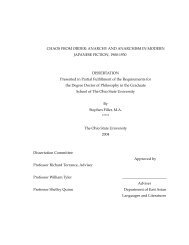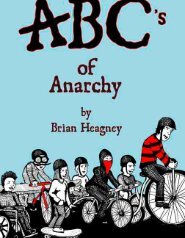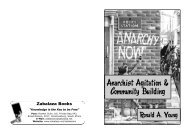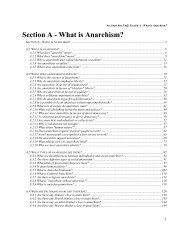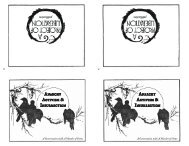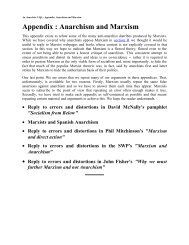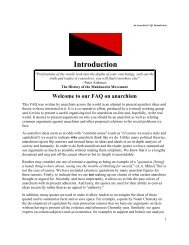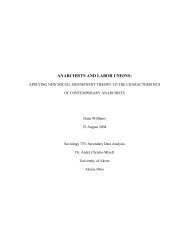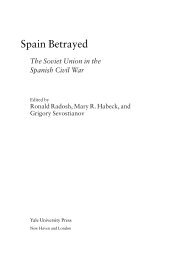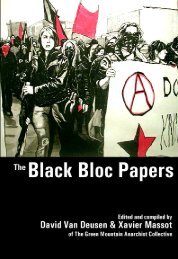Graham Gamblin - Infoshop.org
Graham Gamblin - Infoshop.org
Graham Gamblin - Infoshop.org
You also want an ePaper? Increase the reach of your titles
YUMPU automatically turns print PDFs into web optimized ePapers that Google loves.
fail" he wrote. 64 Kropotkin took a more sober view; while he saw the assassination as<br />
a blow against autocracy and greeted it with enthusiasm, he was disturbed by the<br />
political nature or Russian terrorism, and his writings on the subject stress the<br />
populist inclinations of Perovskaya et al. 65 Meanwhile articles by others appeared in<br />
Le Révolté trying to identify the anarchist movement with Narodnaya volya and to<br />
give an anarchist interpretation to their efforts.<br />
It was in the atmosphere of disintegration, violence and isolation that a<br />
conference was <strong>org</strong>anised in Summer 1881 in London to try to revive the antiauthoritarian<br />
International. It turned out to be a burial rather than a resurrection<br />
however. In preliminary meetings of the "Intimité" (former members of Bakunin's<br />
secret alliance Malatesta, Cafiero, A. Schwitzguébel, L. Pindy plus Kropotkin) only<br />
Kropotkin and Malatesta were in favour of a mass <strong>org</strong>anisation. 66 Cafiero said that the<br />
only thing for the conference to decide was how to <strong>org</strong>anise violence. When the<br />
conference took place, the majority took the anti-<strong>org</strong>anisation and pro-terrorist view,<br />
which the police agent Serraux helped to foster. Kropotkin called for a dual<br />
<strong>org</strong>anisation of a Strikers' International with a mass membership to co-ordinate<br />
economic actions by workers, and within it a clandestine body to <strong>org</strong>anise economic<br />
terror. Malatesta agreed, but added the idea of an <strong>org</strong>anisation to fight states directly;<br />
political struggle was necessary, he claimed, since private property cannot be<br />
destroyed without also destroying the authority that upholds it. 67 Kropotkin rejected<br />
this, fearing the formation of a hierarchical party of conspirators. Others however<br />
rejected the idea of a mass <strong>org</strong>anisation altogether, calling for autonomy of groups<br />
and individuals, with no program or statutes other than an agreement of solidarity<br />
with revolutionary acts. 68 Even the idea of a correspondence bureau was rejected by<br />
some, who feared the potential authority of any central body.<br />
Kropotkin also had to struggle against the obsession with violence of some<br />
delegates. A proposal that every section should study chemistry and military science<br />
was attacked by him; the Russians, he said, had people with prior knowledge of the<br />
64 Ibid. p.190<br />
65 Cahm, op.cit. p.143<br />
66 U. Linse in her Propaganda by Deed and Direct Action, Mommsen/Hirschfeld, Social Protest...<br />
op.cit. connects Kropotkin with anarchism's abandonment of formal <strong>org</strong>anisation in favour of<br />
independent groups cut off from the masses, as does Marie Fleming in Propaganda by the Deed...<br />
op.cit. p.22 In fact Kropotkin fought hard against this tendency.<br />
67 M. Nettlau, Anarchisten und Sozialrevolutionäre, Berlin 1931, p.207<br />
68 Ibid. p.211<br />
29



